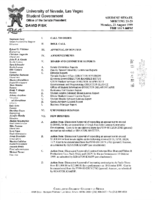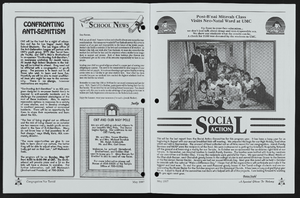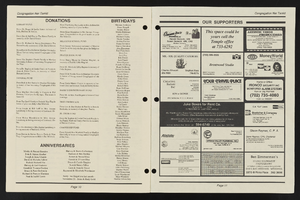Search the Special Collections and Archives Portal
Search Results

Interview with Native American Forum on Nuclear Issues, April 10, 2008
Date
Archival Collection
Description
Text

Meeting minutes for Consolidated Student Senate, University of Nevada, Las Vegas, November 22, 1999
Date
Archival Collection
Description
Text

Meeting minutes for Consolidated Student Senate University of Nevada, Las Vegas, August 23, 1999
Date
Archival Collection
Description
Text

Ellen Barre Spiegel interview, December 4, 2017: transcript
Date
Archival Collection
Description
Ellen Barre Spiegel grew up in Jericho NY, a predominantly Jewish town in Long Island. Her ancestors had migrated to the United Sates prior to the outbreak of World War II. And for much of life her exposure to cultural diversity was limited. Ellen was born in 1962. She attended Cornell University, located in upstate New York, and graduated in 1984. Though the student population was 30% Jewish, the university expanded her knowledge of the world: her Protestant roommate explained that she had never met a Jew and Ellen replied, I have never met a WASP. Her college studies centered on consumer economics and she was a public policy major. Ellen was an early adopter of technology and her career path included positions at American Express, Prodigy (a joint venture of IBM and Sears), the Weather Channel, and Manufacturers Hanover Trust. Each company used her increasing experience with using technologies to improve connections with consumers. Ellen describes her Jewish identity as conservative and is a member of Midbar Kodesh Temple in Henderson. She talks about her bat mitzvah and her move back to New York to recite the mourner’s Kaddish for the year following the passing of her father. Later, she moved to Santa Monica, where she met Bill, her husband, using a new dating site called Luvitt AOL. After marriage, the couple saw financial advantages to living in Las Vegas and relocated their business and home to the valley in 2001. Soon Ellen noted that there was no active Democratic Club in Henderson and it became her mission to reignite the club. This launched a long list of political and civic accomplishments for Ellen. She has been an assemblyperson in the Nevada legislature (2008, 2013-2017). Her list of accomplishments and affiliations are on pages 46-47.
Text

Transcript of interview with Joanna S. Kishner by Barbara Tabach, January 10, 2017
Date
Archival Collection
Description
Joanna Kishner epitomizes the native Southern Nevada who was raised in both a Jewish and secular world of Las Vegas. A daughter of Ellen Neafsey Jobes and Irwin Kishner, she was born in 1964 and graduated from Clark High School in 1982. As she recalls, the halls of Clark High School witnessed a stellar cast of characters in the early 1980s, from future casino executives, to additional judges, to comedian Jimmy Kimmel. Judge Kishner earned a double major in Political Science and Psychology from Claremont McKenna College (1986) and graduated from UCLA School of Law (1989.) She remained in California and worked as senior counsel for Warner Brothers, a division of Time-Warner Entertainment Company and was also an associate with the multi-national firm Paul Hastings Janofsky & Walker. In time, she felt the tug to return to her childhood roots in Las Vegas. She and her husband were married at Temple Beth Sholom, where she had her bat mitzvah and raises her own children in the Jewish tradition. Judge Kishner has been recognized for her legal work throughout the years, this includes pro bono work for disadvantaged children through the Children’s Attorney Project. When she set her sights on becoming a judge, she was joined by her young family as she knocked on thousands of doors to introduce herself and her passion for justice. In 2010, she was elected to Department XXXI of the Eighth Judicial District.
Text

Nora Mirabal interview, August 30, 2019: transcript
Date
Archival Collection
Description
Interviewed by Elsa Lopez and Barbara Tabach. Cuban refugee family by way of Spain and then to the US; arrived in Las Vegas in 1973 when Nora was 9 years old. Struggled in youth but rises up as embraces educaton. Currently is Assistant Director of Academic Partnership at CSN.
Text

Transcript of interview with Christopher Maestas by Claytee White, September 14, 2008
Date
Archival Collection
Description
Christopher “Chris” Maestas (1965-2009) was an engaged educator and leader within the Chicano, Latinx, and Henderson communities. As he traced back his Latinx heritage, he explored his father’s hometown in Llaves, New Mexico, where he and his family were discriminated for their non-white demeanor; and his mother’s paternal Spanish roots; his grandfather came to work in Henderson, Nevada at the Basic Magnesium Industrial (BMI) plants during World War II. The Chicano and Spanish cultures played a significant part in defining his role within the community. For Chris, Chicanos were “people that lived in the southwestern United States particularly southern Colorado, New Mexico and northern Arizona that were originally Mexican citizens before the treaty (Treaty of Guadalupe Hidalgo) was signed and then after the treaty was signed they became Americans.” In this interview, he dives into the difference between Chicano and Spanish cuisine and gives his own tips on how to make Spanish chile relleno. Chris discussed what life was like in Henderson living in Henderson Camp when his grandfather emigrated from Spain in 1943. He described the evolution of the Henderson community in the 50s through his parents’ experiences living in the Hispanic communities of Victory Village and Carver Park. During his childhood in the early 70s, Chris recalled living in Henderson when it was known as Basic and living in a small town-site house. One of his most special recollections was from the summer of 1980, when his family purchased their first set of air-conditioning units. As a passionate teacher and 1984 alumnus from Basic High School, he advocated student engagement as Student Council Advisor. Chris was also an active member of the St. Peter the Apostle, Catholic Church, Knights of the Columbus group and LUPE (Latinos United for Perfect Equality) Club. The LUPE club promoted equality for the Hispanic community and family values. Chris described their Saturday picnics at BMI Park and the annual Henderson Industrial Days festival.
Text



